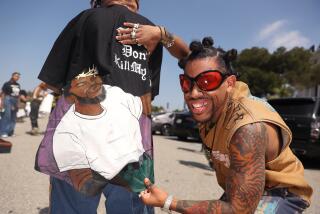The Body Politics : Theater: L.A.’s Ron Athey, whose performance art includes piercing and other body modifications, is at the center of the latest NEA funding flap.
Performance artist Ron Athey, who provoked the latest objections by two U.S. senators to granting practices by the National Endowment for the Arts, speaks in dulcet tones and never forgets to say thank you.
In fact, sometimes he almost sounds like the Church Lady. But that’s not surprising coming from someone whose evangelical aunts reared him to be a child preacher.
What might be more shocking is the contrast between Athey’s nearly prim manners and his controversial performance art.
Tattooed and pierced all over his well-muscled body, Athey’s work engages in onstage rites of body modification--including piercing, branding, bloodletting and cutting. His performances also use S&M;, fetishistic and gender-bending imagery.
Although Athey has some ardent followers, even the sympathetic have been known to become weak of stomach when faced with some of his onstage endeavors.
But despite his current notoriety, he is part of a large movement, the Modern Primitives, that has been a prominent subculture in Los Angeles and elsewhere for the past three or four years. The movement inspired Reza Abdoh’s theatrical performance “Bogeyman,” seen in 1991 at Los Angeles Theatre Center, and has since influenced mainstream pop culture as well--from the women and men in Madonna’s “Sex” book and the singer’s own studded nostril to fashion models’ navel rings.
*
Never has such work been as visible as it is now, since two senators drew national attention to the work.
Prompted by newspaper reports about Athey’s March 5 performance of “Four Scenes in a Harsh Life” at Walker Art Center in Minneapolis (the work was also seen at Highways last fall), Sen. Robert C. Byrd (D-W.Va.), chair of the Senate Appropriations Committee that recommended the cut, and Sen. Don Nickles (R-Okla.) wrote a June 17 letter to NEA Chair Jane Alexander. They complained about a scene in which Athey performs a ritual cutting on a fellow performer, makes prints of the cuts’ bleeding pattern and hangs the papers on a clothesline.
The senators’ objections came just before Congress began considering the current $170.2-million annual appropriation for the NEA; last week, a subcommittee vote in the House recommended a 2% cut in the NEA budget, and a similar vote in the Senate subcommittee recommended a 5% cut. The bill is expected to reach the floor of the Senate sometime after the July 4 recess.
Walker officials say that Athey received only $150 in NEA funds for the performance, a small portion of a larger grant.
The senators warned Alexander that NEA funding could be “in serious jeopardy” because Athey put “audience members . . . at risk” by exposing them to HIV-positive blood.
“I did meet with Jane Alexander and I encouraged her to try and avoid these more notorious grants, those that really are offensive, and Mr. Athey’s is one,” says Nickles. “It may be Mr. Athey’s right to do these so-called performances, but it’s not our obligation to subsidize it.”
Both Athey and Walker officials have denied the senators’ charges that the artist put any audience members at risk. The man whose blood was used to make the prints is HIV-negative. And Athey says no audience members were in danger of coming into contact with any blood, HIV-positive or otherwise.
The senators’ information came from a Washington Post story based on an inaccurate article distributed by a wire service.
Although both Athey and the Walker refuted the report, the misinformation has remained in the public realm. “The inaccuracies have been in hundreds of papers,” says Athey, who works at L.A. Weekly as an editorial assistant, speaking by phone from New York, where he has been performing.
*
The Senate’s proposed cuts are program-specific rather than across-the-board, as were the recommendations in the House version of the bill. In presenting the committee version of the bill, Byrd, who declined comment for this article, pointedly noted that all of the proposed 5% cut “is directed at those grant programs which have been at the center of recent controversies.”
Athey was raised in Pomona and is a former punk-scene member who once wanted to be a scientist. He began writing and getting tribal-style tattoos around 1981, but it wasn’t until 1991 that he began to explore his current mode of performance. Since then, he’s appeared at a variety of clubs and alternative-art spaces, along with the prestigious Walker Art Center.
Athey’s recent notoriety apparently hasn’t jeopardized his growing popularity. Next month, he is scheduled to perform in London and Vienna, and a SoHo gallery will open a show about his work. Within a month, a film of Athey’s controversial performance piece will be released by New Queer Cinema.
Yet Athey, who can seem almost willfully naive about the vicissitudes of politics, still appears dismayed at the tempest and the ways in which his work has been used as a political symbol by conservative politicians. “I’m not overtly political. I’m more emotional,” he says. “Politics just gets dragged into it because of my working with the body.”
The politics have indeed eclipsed any discussion of the work’s content--which includes symbolic and allegorical responses to his ultra-Fundamentalist upbringing. His works rely heavily on references to martyr symbols and archetypes as well as stigmata.
The artist says part of “Four Scenes in a Harsh Life” is about “redemption from self-destruction and suicide.” Other sections of the partly autobiographical piece focus on “juxtaposing traditional ceremony against tribal rituals and fetishes. Only because of the age we live in is the subcontext AIDS.”
Athey believes the political focus on his work is just part of a larger issue. “When people don’t understand something, there’s fear involved,” he says. “Actually, a lot of people with tattoos and piercing are very nice people. That’s just their kink.”
More to Read
The biggest entertainment stories
Get our big stories about Hollywood, film, television, music, arts, culture and more right in your inbox as soon as they publish.
You may occasionally receive promotional content from the Los Angeles Times.










